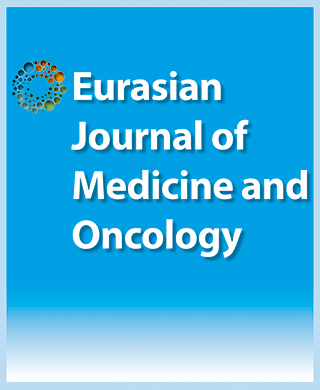

Relation between Stress Hyperglycemia and Mortality in Patients with Acute Myocardial Infarction
Nazli Gormeli Kurt1, Murat Orak2, Mehmet Ustundag21Department of Emergency, State Hospital, Batman, Turkey, 2Department of Emergency, University of Dicle Faculty of Medicine, Diyarbakır, Turkey,
Objectives: Acute myocardial infarction (AMI) is one of the leading causes of death in industrialized countries. Hyperglycemia and impaired glucose tolerance are common during AMI. We aimed to investigate the effect of stress (acute) hyperglycemia on mortality in patients with AMI who were not previously diagnosed with diabetes mellitus (DM). Methods: We retrospectively reviewed 307 patients with acute coronary syndrome (ACS) who were admitted to the Emergency Department of Batman Regional State Hospital between January 1, 2014 and January 1, 2018. Stress hyperglycemia was considered to be present in patients with no DM history with a blood glucose level of >140 mg/dL or who had an HbA1c value of <6.5 in the last 3 months. Results: Of the 307 patients in our study, 211 (68%) were male and 96 (32%) were female. Stress hyperglycemia was detected in 141 (45.9%) of the patients. It was found that 69% of patients with stress-related hyperglycemia had ST segment elevation myocardial infarction (STEMI) and 31% had non-ST segment elevation myocardial infarction (NSTEMI). We found that the rate of STEMI detection in patients with stress hyperglycemia was statistically significantly higher than that in NSTEMI (p<0.001). We found a significant relationship between the duration of hospital stay and hyperglycemia compared with the duration of hospitalization with stress hyperglycemia (p=0.01). In total, 24 patients (7.8%) died. Stress hyperglycemia was present in 66.1% of patients with exclusion, whereas 33.9% of patients did not have stress hyperglycemia. We found a statistically significant relationship between exclusion patients and stress hyperglycemia (p=0.002). Conclusion: We found a significant association between stress hyperglycemia and mortality and duration of hospital stay in patients with AMI. We believe that prognosis and mortality of patients with AMI can be predicted using blood sugar level at the time of admission.
Cite This Article
Gormeli Kurt N, Orak M, Ustundag M. Relation between Stress Hyperglycemia and Mortality in Patients with Acute Myocardial Infarction. EJMO. 2018; 2(3): 138-141
Corresponding Author: Nazli Gormeli Kurt



